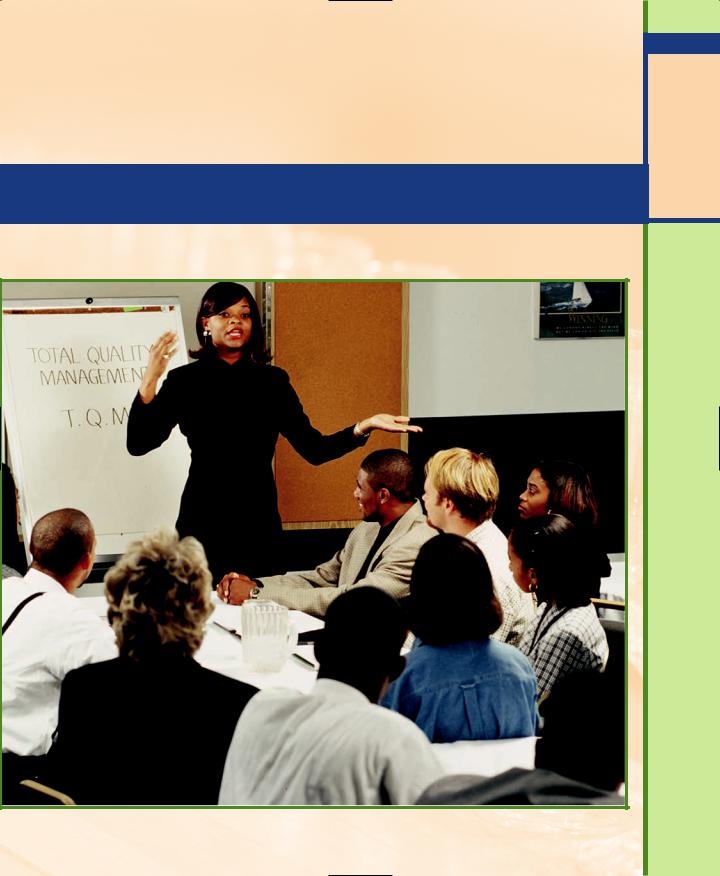
- •CONTENTS
- •PREFACE
- •Content—Benefits for Students
- •Content—Benefits for Instructors
- •Features of the Book for Students and Instructors
- •Supplementary Materials
- •Acknowledgments
- •What Is Hospitality Management?
- •The Manager’s Role in the Hospitality Industry
- •Why Study in a Hospitality Management Program?
- •Planning a Career
- •Employment as an Important Part of Your Education
- •Getting a Job
- •Employment at Graduation
- •The Outlook for Hospitality
- •Summary
- •Managing Change
- •Demand
- •Supply
- •Workforce Diversity
- •The Impact of Labor Scarcity
- •Summary
- •The Varied Field of Food Service
- •The Restaurant Business
- •The Dining Market and the Eating Market
- •Contemporary Popular-Priced Restaurants
- •Restaurants as Part of a Larger Business
- •Summary
- •Restaurant Operations
- •Making a Profit in Food Service Operations
- •Life in the Restaurant Business
- •Summary
- •Chain Restaurant Systems
- •Independent Restaurants
- •Franchised Restaurants
- •Summary
- •Competitive Conditions in Food Service
- •The Marketing Mix
- •Competition with Other Industries
- •Summary
- •Self-Operated Facilities
- •Managed-Services Companies
- •Business and Industry Food Service
- •College and University Food Service
- •Health Care Food Service
- •School and Community Food Service
- •Other Segments
- •Vending
- •Summary
- •Consumer Concerns
- •Food Service and the Environment
- •Technology
- •Summary
- •The Evolution of Lodging
- •Classifications of Hotel Properties
- •Types of Travelers
- •Anticipating Guest Needs in Providing Hospitality Service
- •Service, Service, Service
- •Summary
- •Major Functional Departments
- •The Rooms Side of the House
- •Hotel Food and Beverage Operations
- •Staff and Support Departments
- •Income and Expense Patterns and Control
- •Entry Ports and Careers
- •Summary
- •The Economics of the Hotel Business
- •Dimensions of the Hotel Investment Decision
- •Summary
- •The Conditions of Competition
- •The Marketing Mix in Lodging
- •Product in a Segmented Market
- •Price and Pricing Tactics
- •Place—and Places
- •Promotion: Marketing Communication
- •Summary
- •The Importance of Tourism
- •Travel Trends
- •The Economic Significance of Tourism
- •The United States as an International Tourist Attraction
- •Businesses Serving the Traveler
- •Noneconomic Effects of Tourism
- •Summary
- •Motives and Destinations
- •Mass-Market Tourism
- •Planned Play Environments
- •Casinos and Gaming
- •Urban Entertainment Centers
- •Temporary Attractions: Fairs and Festivals
- •Natural Environments
- •On a Lighter Note. . .
- •Summary
- •Management and Supervision
- •The Economizing Society
- •The Managerial Revolution
- •Management: A Dynamic Force in a Changing Industry
- •What Is Management?
- •Summary
- •Why Study Planning?
- •Planning in Organizations
- •Goal Setting
- •Planning in Operations
- •The Individual Worker as Planner
- •Long-Range Planning Tools
- •Summary
- •Authority: The Cement of Organizations
- •Departmentalization
- •Line and Staff
- •Issues in Organizing
- •Summary
- •Issues in Human-Resources Management
- •Fitting People to Jobs
- •Recruiting
- •Selection and Employment
- •Training
- •Retaining Employees
- •Staff Planning
- •Summary
- •The Importance of Control
- •Control and the “Cybernetic Loop”
- •Tools for Control
- •Summary
- •Leadership as Viewed by Social Scientists
- •Why People Follow
- •Leadership Theories
- •Communication
- •The Elements of Leading and Directing
- •Developing Your Own Leadership Style
- •Summary
- •A Study of Service
- •Rendering Personal Service
- •Managing the Service Transaction
- •How Companies Organize for Service
- •Summary
- •INDEX

524 |
Chapter 15 Management: A New Way of Thinking |
Summary
This chapter began our discussion of management. First, we defined management and supervision. Second, we outlined the history of coping with economic prob-
lems: tradition, command, and the market system.
We turned then to three pioneers in management theory: Taylor and his work process focus, the task idea, and the controlled shop; Fayol and administrative management; and Mayo and his concern with the worker.
We moved to a discussion of pioneers in the hospitality industry. Statler introduced the idea of a popular-priced, full-service hotel, as well as uniform standards in all his hotels. He was perhaps the first to recognize the power of the middle-class market in regard to the hospitality industry.
The Stouffers adapted Taylor’s and Fayol’s ideas to their restaurants. They used a recipe kitchen—a controlled shop—which standardized the management and organization of their restaurants. Johnson, Sanders, Kroc, and Wilson all played key roles in developing franchise organizations based on voluntary adherence, mutual interest, and shared knowledge. They offer a national organization a local focus in every market they serve.
The last section of this chapter was devoted to a study of Drucker’s theories of management and how they apply to the hospitality industry. We considered several questions: What is management? Who is the customer? What is value to the customer? What will our business be? What should our business be?
Key Words and Concepts
Management |
Span of control |
Supervision |
E. M. Statler |
Tradition |
Vernon and Gordon Stouffer |
Command |
Howard Johnson |
Market system |
Harland Sanders |
Work process focus |
Ray Kroc |
High-priced man |
Kemmons Wilson |
Task idea |
Sam Barshop |
Controlled shop |
Recipe kitchen |
Administrative management |
Franchise systems |

Summary 525
Review Questions
1.How do management and supervision differ?
2.Describe Taylor’s principal contributions to management theory.
3.What were Statler’s main contributions to hospitality management? What were the Stouffers’ main contributions?
4.What are the forces that bind modern franchise organizations together?
5.According to Drucker, what should our business—the hospitality industry—be?
Internet Exercises
1.Site name: Search Engines
URL: Google—www.google.com
AlltheWeb.com—www.alltheweb.com
Yahoo—www.yahoo.com
MSN Search—search.msn.com
AltaVista—www.altavista.com
Background information: Many current management philosophers differentiate management from leadership skills. As a manager in the hospitality industry, you will be using both management and leadership skills throughout your career. The key is to determine how they differ and when to use them appropriately.
Use your favorite search engine or one listed above and search for articles/information on management versus leadership.
Exercises:
a.Determine what characteristics differentiate a manager from a leader.
b.Lead a class discussion on which is more important—managers or leaders.
c.When is it most appropriate to use management skills and/or leadership skills?
d.Choose an article that addresses the issue of management versus leadership and discuss the author’s perspective on the differences and similarities. Do you agree with the author? Why or why not?
2.Site name: Search Engines
URL: Google—www.google.com
AlltheWeb.com—www.alltheweb.com
Yahoo—www.yahoo.com
MSN Search—search.msn.com
AltaVista—www.altavista.com

526 |
Chapter 15 Management: A New Way of Thinking |
Background information: There have been many leaders in the hospitality industry such as Ray Kroc, Howard Johnson, Harland Sanders, Kemmons Wilson, Vernon and Gordon Stouffer, Sam Barshop, John Q. Hammons, Horst Schultze, and so on. Choose a current or past leader and search for information on that individual using your favorite search engine or one of the search engines listed above.
Exercises:
a.Discuss the contributions this individual has made to the hospitality industry and how the industry has changed as a result of his or her actions.
b.Where do you see your chosen individual using management skills and/or lead-
ership skills most effectively?
3.Site name: The Art and Science of Leadership
URL: www.nwlink.com/~donclark/leader/leader.html
Background information: This leadership guide is for supervisors, managers, lead em-
ployees, and anyone wishing to move up through the ranks as a leader.
Site name: The Free Management Library: Introduction to Management
URL: www.managementhelp.org/mng_thry/mng_thry.htm
Background information: The Free Management Library provides easy-to-access, clutter-free, comprehensive resources regarding the leadership and management of yourself, other individuals, groups, and organizations. The content is relevant to the vast majority of people, whether they are in large or small for-profit or nonprofit organizations. Over the past ten years, the Library has grown to be one of the world’s largest well-organized collections of these types of resources.
Exercises:
a.Choose one of the “chapters” on the Web site that is of interest to you. Lead a class discussion on the management and leadership concept you chose and describe why this information would be important to a hospitality manager.
b.Read the section on leadership styles. Which style do you think is the most appropriate for a hospitality manager? Why?
Notes
1.Robert L. Heilbroner, The Making of Economic Society, 4th ed. (Englewood Cliffs, NJ: Prentice-Hall, 1972).
2.Frederick W. Taylor, The Principles of Scientific Management (New York: Norton, 1967).
3.Floyd Miller, Statler: America’s Extraordinary Hotelman (Buffalo: The Statler Foundation, 1968).
4.Nothing said here should be interpreted to imply that franchise organizations are more perfect, necessarily more humane, or freer of error, politics, and the arbitrary exercise of power than are independently owned operations. In fact, no human organization achieves

Summary 527
perfection, and neither do franchise organizations. They do, however, have the substantial advantages set forth here.
5.Peter Drucker, Management: Tasks, Responsibilities, Practices (New York: Harper & Row, 1974), p. 63. The discussion in this section takes many of its ideas from Chapters 6 and 7 of Drucker’s book. This is a classic text with which all hospitality students should be familiar.
6.Ibid., p. 76.
7.Ibid., p. 92.

The Hospitality Industry
(Courtesy of Sodexho.)

C HCAHPATPETRE RS I XOTNEEE N
PlanningTheHospitalityin Hospitality
IndustryManagementand You
The Purpose of this Chapter
Planning is a necessary everyday activity both in life and in managing. Planning should go on at every level of the organization, from dishwasher to the chairman of the board. Unfortunately, it often gets overlooked at all these levels. Planning for your life’s work is as essential as planning
today’s menu. Accordingly, this chapter presents planning as an active process related to both longrange organizational goals and day-to-day work. Although the concepts we present are most clearly related to planning in organizations, they need only be adapted to be useful to students considering their career goals.
THIS CHAPTER SHOULD HELP YOU
1.Provide an example illustrating the necessity of planning at all levels.
2.Explain why it is important that the supervisor/manager’s role involve both planning and acting on the plans of others.
3.Define and describe the following key planning concepts: policies, plans, rules, methods, procedures, standards, budgets, strategies, and tactics.
4.Provide an example illustrating how the needs and wants of a guest/client drive the goal-setting and planning process.
5.Describe planning as a general management function (strategic planning), as an operation management function (tactical planning), and as work done by individuals for the organization and for themselves.
6.Explain why policy development and long-range planning are important, and describe the following tools related to these activities: return on investment and cost-benefit analysis.
